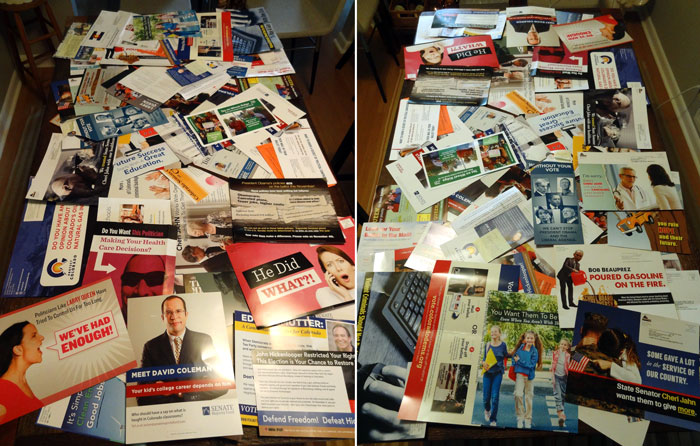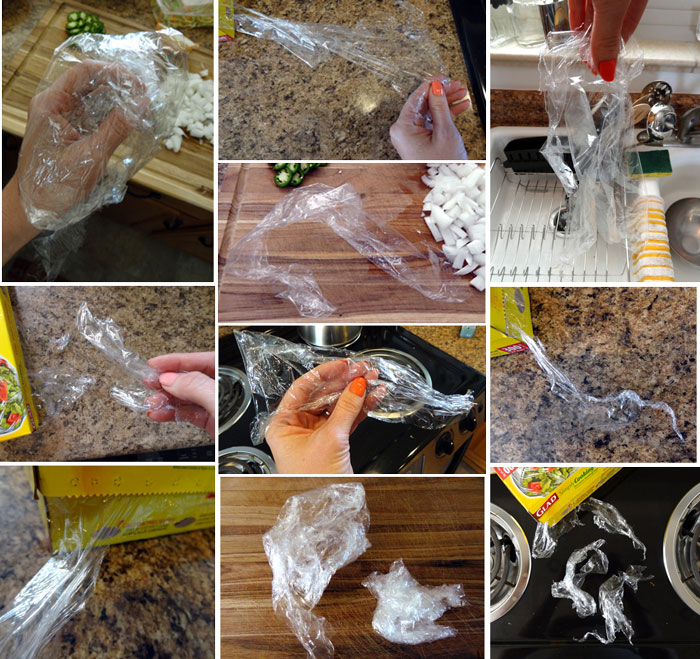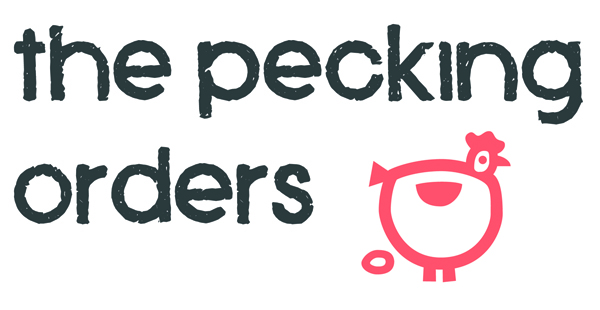Two weeks ago, I was doing the usual: indifferently placing large volumes of political ads into the recycling bin. As I tossed these lovely brochures, I suddenly felt sorry for them. I thought about all the people that spent time creating them; there were volunteers, meetings, arguments, expense reports. But here, at what should be the climax of the ads’ purpose, the sole reason for their creation, the targeted voter did not read them. I barely even glanced at them as I threw them into the recycling.
I walked away but I kept thinking about the ads. I wondered if I was wrong. I wondered if they had anything to say. How can I conclude they are trash if I never read them? A few hours later, when I couldn’t take the curiosity anymore, I went dumpster diving. I grabbed the ads out of the trash, saving them from futile doom. I was going to read them, damn it. All of them. From that day through Election Day.
This is how I ended up an enormous pile of garbage…

As of today, six days from Election Day, I have received 61 political ads in the mail. 61 in two weeks, which averages out to five per mail day and the vast majority of these are repeats of the same two or three messages. We still have five mail days to go. Oh what bounties will my mailman bring?!
Did I read them, you ask? Oh yes, I read them. I read all over them. I tried really hard to learn from the ads but what I learned most of all was that my initial conclusion was correct: they should be placed unread into the recycling bin. I learned that none of the messages are 100% truth. They are all just weak conclusions drawn from traits/events/statements purposely taken out of context. I also learned that although there are words, charts, and bolded phrases all over them, the ads are almost entirely empty. They pretty much say nothing at all.
The campaign strategy is clear (I’m sure there are dissertations written about its effectiveness), and the strategy is quite effective. Here it is:
Step One:
State your message as often as possible. Make modest changes to the language so that it appears to be new material. Say it clearly and say it obsessively, so the reader has no choice but to memorize it.
Step Two:
Martha Stewart it up with shiny paper, fancy font, obscure citations, and reeeeeally stretch the statistics.
Step Three:
The reader will subconsciously commit the ghost of the message to memory. Once the message is memorized, it will begin to seem like truth to the reader, and then the strategy is complete.
It’s true. Once you hear something enough, once it’s engrained into your memory, it’s hard not to see it as reality. Basic human psychology, folks. They do it because it works. Still, I find going after our automatic memory response is lazy and unfair; we can’t help but absorb the messages. After all, we are only cavegirls, grooorgh!
The challenge for campaign strategists is how to capture our highly limited attention spans. It is precisely our limited attention that is the entire reason for the simplify and robo-repeat strategy. It makes perfect sense. I know I’m not the only one that indifferently places the ads into the recycling bin, so they have to somehow get my attention in the few seconds they have with me. So they use catchy language, quick summaries, and leading images to tell their story in seconds. There is no other way to reach us.
The leading images are one of my favorite parts of the ads. Here is a small sample of the alarmist languages and images used:

I particularly enjoy the unflattering photos of opponents, which are usually depictions of them mid-sentence. I mean, which one of the below photos do you think came from her opponent?
 The message I get is loud and clear: that girl be cray-cray, tryin’ to steal all my money, uh uh.
The message I get is loud and clear: that girl be cray-cray, tryin’ to steal all my money, uh uh.
In general, the ads are incredibly predictable in their storytelling and I find them to be insulting to our intelligence. I can always guess the moral of the story, which is always: “Candidate X wants to murder your mom and imprison all the kittens!” The ads also ask a lot of questions with really obvious answers. For example, I found myself thinking the following:
Sure, I like children being safe.
No, I don’t like giving all my money away.
Yes, I DO like my freedom.
No, I don’t want to ruin all hope for a decent future!
Of COURSE I don’t want ISIS/Ebola making us all die!!
Don’t you DARE question my patriotism! GOD BLESS AH-MERICA!!!!
I think it is how shamelessly full of holes the arguments in the ads are that irked me the most. They are mostly illogical conditional formulas like, if A is B and B is C, then C is an America hater! After each ad I thought, “Well, that sounds like a bunch of horsesh*t…” Not a single one felt genuine. Not one of the 61 ads gave me a better impression of who the candidate really was or what the proposition really meant. Each one left me needing to decode the statements on my own time through outside research.
The weird thing is we all know there is no truth in political ads; it is discussed publicly, but still the strategy of robo-repeat continues and we continue to fall for it. The weirder thing is this strategy only exists because we created it. Very few of us are actually involved in the political process. VERY few. How many of us actually do outside research? How many of us sit down and thoroughly read the pros and cons to propositions? Who among us actually does background research on judges or school superintendents? Go ahead, raise your hands…
The real moral of the story is that we have no one to blame for this garbage strategy but ourselves. At the end of the day, we created this reality. We created it by only giving the political process — the privilege of being able to vote — the few seconds between picking up the ads and throwing them away. I think we’ve forgotten that voting is when we get to influence, it DOES matter. It should be our most involved part, the most important part, not all our wanking that follows later. So, as long as we are indifferent to the privilege of voting, those we elect will yell weird, empty stuff at us on their way to the trash (recycling bin).
Things They Forgot to Mention:
As long as we aren’t really interested in elections, we can expect to be given an enormous pile of garbage every other November. Double entendre intended.



